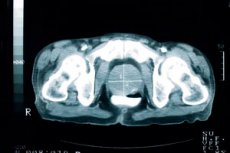
目前,使用免疫疗法治疗前列腺癌较为困难。然而,美国最大的癌症研究和治疗机构之一希望之城®的研究人员开展了全球首个嵌合抗原受体 (CAR) T 细胞疗法的 I 期临床试验,该研究今日发表于《自然医学》杂志,结果显示,前列腺癌患者可以安全地接受细胞免疫疗法治疗,且疗效显著。
该研究采用CAR-T细胞疗法治疗了14名转移性去势抵抗性前列腺癌(mCRPC)患者。mCRPC患者的前列腺干细胞抗原(PSCA)已扩散至前列腺之外,且对激素治疗失去反应。在美国,每年有超过3.4万名患有此类前列腺癌的男性死亡。
希望之城血液学和造血细胞移植系助理教授Saul Preisman博士及其同事开发了CAR-T细胞,该细胞靶向一种名为前列腺干细胞抗原(PSCA)的蛋白质,这种蛋白质已被发现在前列腺癌患者中高表达。该治疗方法包括从患者血液中提取T细胞,并在实验室中用CAR对其进行重新编程,使其识别并攻击癌细胞表面的PSCA蛋白。然后将CAR-T细胞输回患者体内,以杀死癌细胞。
前列腺癌被称为“免疫沙漠”——肿瘤星云很难用免疫疗法治疗,因为进入肿瘤的T细胞数量很少。需要一些真正强大的疗法来克服这个问题。我们的研究表明,希望之城的前列腺癌CAR-T细胞疗法或许是朝着实现这一目标迈出的一步。
Tanya Dorff 医学博士、哲学博士是希望之城泌尿生殖系统疾病项目的部门主任,也是医学肿瘤学和治疗研究系的教授。
“我们研究的关键发现是,靶向PSCA的CAR-T细胞对mCRPC安全有效,”Priceman补充道。“这为进一步开发此类细胞免疫疗法,为目前没有其他有效治疗选择的患者开辟了可能性。”
试验的目的是调查治疗的安全性和剂量限制性毒性,以及获取患者治疗效果的初步数据。
研究结果:患者单次输注 1 亿个 CAR T 细胞,之前未接受淋巴细胞清除化疗,淋巴细胞清除化疗通常用于治疗血液疾病,以提高 CAR T 细胞治疗的有效性。由于这是 CAR T 细胞的首次临床试验,因此评估 CAR T 细胞单独用于患者的安全性非常重要。在相同剂量的 CAR T 细胞和淋巴细胞清除的情况下,发生了剂量限制性毒性并发症膀胱炎或膀胱刺激。Dorff 解释说,PSCA 也存在于膀胱中,因此 CAR T 细胞可能攻击膀胱细胞,引起炎症。研究人员随后在研究中增加了一个淋巴细胞清除较少的新组,这减轻了这种毒性。14 名患者中有 4 名的 PSA 水平下降,PSA 水平是前列腺癌患者病情进展的连续标志物,其中一名患者的 PSA 水平显著下降。图像显示了一部分接受治疗的患者对治疗的反应。 14 名患者中有 5 名患有轻度至中度细胞因子释放综合征,这种症状是由免疫细胞向血液中快速大量释放细胞因子引起的,是 CAR T 细胞治疗后的常见副作用。细胞因子释放综合征是一种可治疗的副作用。在 28 天的观察期后,CAR T 细胞未能维持高水平,从而限制了治疗效果。这代表了 CAR T 细胞治疗实体瘤领域的一个常见问题,研究人员计划在希望之城的后续研究中使用现已开放入组的一种疗法来解决这个问题。一名之前已经接受过几种疗法的患者对 CAR T 细胞疗法反应良好。他的 PSA 水平下降了 95%,骨骼和软组织中的癌症也缩小了。他经历的这些积极反应持续了大约八个月。
多尔夫表示:“这位患者的治疗结果非常令人鼓舞,我们非常感谢他参与我们的研究,也感谢其他患者及其家人。我们希望继续这种疗法,增加CAR-T细胞的数量,并继续密切监测任何健康问题,因为我们相信这可能会提高治疗效果。”
一项使用 PSCA CAR T 细胞疗法联合放射疗法来增强抗肿瘤活性的 1b 期临床试验计划招募最多 24 名患者。
希望之城是CAR-T细胞疗法领域公认的领导者,自20世纪90年代末启动CAR-T疗法项目以来,已治疗了近1500名患者。该机构目前拥有全球最广泛的CAR-T细胞疗法临床试验项目之一,目前正在进行近70项CAR-T细胞临床试验,涵盖13种不同类型的实体瘤。这些试验采用了希望之城自主研发的疗法和来自业界的产品。最近发表在《自然医学》杂志上的一项研究介绍了希望之城针对脑肿瘤的CAR-T细胞疗法。

